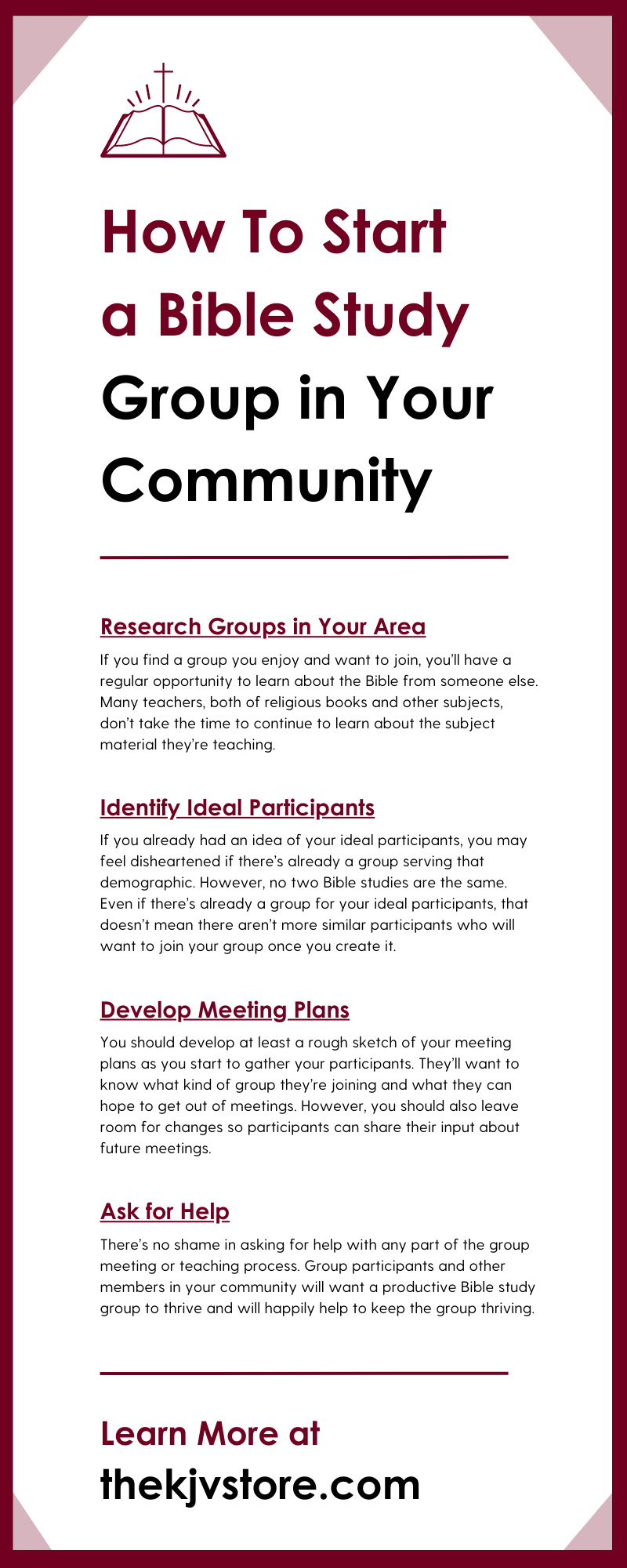How To Start a Bible Study Group in Your Community

There are many faith-based groups in any community, including yours. If you want to study the Bible but aren’t sure there’s a Bible study group in your community that will meet your needs, you can start one yourself. Keep reading to learn how to start and lead that group.
Research Groups in Your Area
As we mentioned above, most communities have various faith-based groups that you can pick from to attend. Research the groups that are already meeting in your area. You may or may not find one you enjoy, and both options can help you start your own group.
If you find a group you enjoy and want to join, you’ll have a regular opportunity to learn about the Bible from someone else. Many teachers, both of religious books and other subjects, don’t take the time to continue to learn about the subject material they’re teaching. But staying a student keeps you humble and helps you better connect with the subject material you’re both learning and teaching. It’s also a good idea to attend a Bible study group before teaching one so you can understand how they work and what participants will expect.
However, if you don’t find a group you like in your area, that’s okay. This means there are underserved demographics looking for a particular group, just like you are. You now know what meeting needs are going unfulfilled, and you can create a plan to address them with your group.
Identify Ideal Participants
Researching groups in your area should help you get an idea of who you want to participate in your group and what demographics your group can serve. For example, your research may have taught you that most Bible study groups in your area are for elderly people. Your group can fill the gap with young people, offering a study for millennials or even Gen Z. You may have noticed that most Bible studies are for committed Christians and want your Bible study to function more as a book club exploring important religious literature. Other people in your community probably feel the same, and you can invite them to your group so you can explore together.
If you already had an idea of your ideal participants, you may feel disheartened if there’s already a group serving that demographic. However, no two Bible studies are the same. Even if there’s already a group for your ideal participants, that doesn’t mean there aren’t more similar participants who will want to join your group once you create it. You’ll just need to share how your group is different than the other group and what similar participants can get out of it.
Develop Meeting Plans
You should develop at least a rough sketch of your meeting plans as you start to gather your participants. They’ll want to know what kind of group they’re joining and what they can hope to get out of meetings. However, you should also leave room for changes so participants can share their input about future meetings.
Together, you can decide to follow a study that someone else made or read and answer questions without an extra guide. You can also decide how often you’ll meet, where, and if people want additional activities before or after, such as a group dinner beforehand or relaxing game time after. No two Bible study group meeting plans will look the same, and that’s okay. As long as your participants are happy with the plans you make together, your group will enjoy meeting.
Ask for Help
While developing your meeting plans or starting to lead your group, you may realize you can’t do it alone. Few people can plan and lead on their own, and that’s okay. Evaluate your weak spots and what type of help you need. If you often forget to send out invitations and struggle to keep up with phone calls or messages from group members, ask someone to help with the clerical duties. If your schedule changes and you can only come to every other meeting, ask someone to co-lead the group with you. If you can’t answer all the questions members have during Bible discussions, learn more about the subjects during your free time or ask someone more knowledgeable to participate.
There’s no shame in asking for help with any part of the group meeting or teaching process. Group participants and other members in your community will want a productive Bible study group to thrive and will happily help to keep the group thriving.
Provide Supplies
One question participants may have as you start meeting is if any supplies are provided. If you’re following a particular Bible study found in a book or expect participants to take notes, provide the necessary supplies for them. Otherwise, participants who can’t afford these supplies or forget them may feel they can’t fully participate.
Provide at least one extra book or copies of the pages you’ll read from. Leave a jar of writing utensils and paper, either loose-leaf paper or small notebooks, for anyone to take. Don’t draw attention to whether people regularly use these supplies. The point of your group is to study the Bible together, and everyone should have access, no matter how regularly, to the necessary studying supplies. Ask for donations from other group members or related groups in the community, such as churches, if you can’t afford to provide these extra supplies yourself.
Reflect and Revise
Start your group. After your first meeting, and every meeting after that, pause to reflect on how the meeting went. Think about how you can revise it to work better in the future. These reflections and revisions can come in any size. You may reflect and realize that some people in the group were especially quiet. Talk to them privately and casually to learn why and if there was anything causing their discomfort, then change it for the next meeting. During your reflections, you may consider how drained you feel at the end of the meeting. Consider revising the meeting structure to give you time to relax before the meeting so you have enough energy to lead well. Other realizations may come during this reflection time, and you should always do your best to address them so the group can thrive.
After you’ve had all your meetings, ask the group members to reflect with you. What did they enjoy from this group? What could change for the better? Work these reflections and ideas into plans for your next Bible study if you choose to start another one.
Starting a Bible study group can feel daunting, from figuring out how to get started to finding the right participants in your community. With the right plans and supplies, though, you can thrive. One of the supplies you should keep on hand for any type of Bible study group is Bibles. Our King James 1611 Bible is one of the most accurate KJV translations you’ll find. Your participants will appreciate the beautiful language and accuracy of this book during your meetings, so consider buying some to provide for them.

